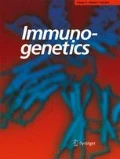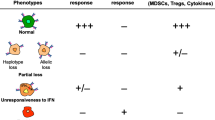Abstract
Despite the potential efficacy of cancer immunotherapy in preclinical studies, it did not show yet significant positive clinical results in humans with only a small number of cancer patients demonstrating objective tumor regression. This poor clinical outcome can be explained by the generation of sophisticated tumor immune escape mechanism, in particular, abnormalities in the expression of HLA class I antigens. We have studied the expression of HLA class I antigens in ten metastatic lesions obtained from a melanoma patient undergoing immunotherapy. Five lesions were obtained after Interferon-alpha-2b treatment and five after autologous vaccination plus BCG (M-VAX). Eight metastases were regressing after immunotherapy while two were progressing. The eight regressing metastases showed high level of HLA class I expression, whereas the two progressing lesions had low levels as measured by real time PCR and immunohistological techniques. These results indicate a strong association between HLA class I expression and progression or regression of the metastatic lesions. Our data support the hypothesis that the level of HLA class I expression is an important parameter of tumor immune escape that needs to be monitored.






Similar content being viewed by others
References
Abril E, Real LM, Serrano A, Jimenez P, Garcia A, Canton J, Trigo I, Garrido F, Ruiz-Cabello F (1998) Unresponsiveness to interferon associated with STAT1 protein deficiency in a gastric adenocarcinoma cell line. Cancer Immunol Immunother 47:113–120
Ahmad M, Rees RC, Ali SA (2004) Escape from immunotherapy: possible mechanisms that influence tumor regression/progression. Cancer Immunol Immunother 53:844–854
Algarra I, Garcia-Lora A, Cabrera T, Ruiz-Cabello F, Garrido F (2004) The selection of tumor variants with altered expression of classical and nonclassical MHC class I molecules: implications for tumor immune escape. Cancer Immunol Immunother 10:904–910
Aptsiauri N, Cabrera T, Garcia-Lora A, Lopez-Nevot MA, Ruiz-Cabello F, Garrido F (2007) MHC class I antigens and immune surveillance in transformed cells. Int Rev Cytol 256:139–189
Aptsiauri N, Cabrera T, Mendez R, Garcia-Lora A, Ruiz-Cabello F, Garrido F (2007) Role of altered expression of HLA class I molecules in cancer progression. Adv Exp Med Biol 601:123–131
Belli F, Testori A, Rivoltini L, Maio M, Andreola G, Sertoli MR, Gallino G, Piris A, Cattelan A, Lazzari I, Carrabba M, Scita G, Santantonio C, Pilla L, Tragni G, Lombardo C, Flavio A, Marciano A, Queirolo P, Bertolini F, Cova A, Lamaj E, Ascani L, Camerini R, Corsi M, Cascinelli N, Lewis JJ, Srivastava P, Parmiani G (2002) Vaccination of Metastatic Melanoma Patients With Autologous Tumor-Derived Heat Shock Protein gp96-Peptide Complexes: Clinical and Immunologic Findings. J Clin Oncol 20(20):4169–4180
Benitez R, Godelaine D, Lopez-Nevot MA, Brasseur F, Jiménez P, Marchand M, Oliva MR, van Baren N, Cabrera T, Andry G, Landry C, Ruiz-Cabello F, Boon T, Garrido F (1998) Mutations of the beta2-microglobulin gene result in a lack of HLA class I molecules on melanoma cells of two patients immunized with MAGE peptides. Tissue Antigens 52:520–529
Berd D (2004) M-VAX: an autologous, hapten-modified vaccine for human cancer. Expert Rev Vaccines 3:521–527
Buteau Ch, Suetomir N, Markovic, Celis E (2002) Challenges in the development of effective peptide vaccines for cancer M. Clin Proc 77:339–349
Cabrera CM, Lopez-Nevot MA, Jimenez P, Garrido F (2005) Involvement of the chaperone tapasen in HLA-B44 allelic losses in colorectal tumors. Int J Cancer 113:611–618
Cabrera T, Lara E, Romero JM, Maleni I, Real LM, Ruiz-Cabello F, Valero P, Camacho FM, Garrido F (2007) HLA class I expression in metastatic melanoma correlates with tumor development during autologous vaccination. Cancer Immunol Immunother 56:709–717
De Pablo R, Compte M, Muro R, Solis R, Moreno ME, Kreisler M, Vilches C (2003) Cytofluorometric characterization of two monoclonal antibodies recognising polymorphic epitopes of HLA class I molecules: 30.13.38 (anti-A*02, A*68 and A*69) and 29.30.6 (anti-Bw6). Inmunología 22:321–328
Festenstein H, Garrido F (1986) MHC antigens and malignancy. Nature 322(6079):502–503
Garcia-Lora A, Añgarra I, Gaforio JJ, Ruiz-Cabello F, Garrido F (2002) Immunoselection by T lymphocytes generates repeated MHC Class I-deficient metastatic tumor variants. Int J Cáncer 91:109–19
Garrido F, Algarra I (2001) MHC antigens and tumor escape from immune surveillance. Adv Cancer Res 83:117–158
Garrido F, Ruiz-Cabello F, Cabrera T, Pérez-Villar JJ, López-Botet M, Duggan-Keen M, Stern PL (1997) Implications for immunosurveillance of altered HLA class I phenotypes in human tumours. Immunol Today 18(2):89–95
Griffioen M, Ouwerkerk IJ, Harten V, Gobin SJ, van den Elsen PJ, Schrier PI (1999) Role of the interferon-stimulated response element in HLA-B downregulation in human melanoma cell lines. Immunogenetics 49(4):287–294
Gutterman JU (1994) Cytokine therapeutics: lessons from interferon-alpha. Proc Natl Acad Sci USA 91:1198–205
Hersey P, Menzies SW, Coventry B, Nguyen T, Farrelly M, Collins S, Hirst D, Johnson H (2005) Phase I/II study of immunotherapy with T cell peptide epitopes in patients with stage IV me1anoma. Cancer Immunol Immunother 54:208–218
Khong HT, Restifo NP (2002) Natural selection of tumor variants in the generation of “tumor escape” phenotypes. Nat Immunol 3:999–100
Koene GJ, Arts-Hilkes YH, van der Ven KJ, Rozemuller EH, Slootweg PJ, de Weger RA, Tilanus MG (2004) High level of chromosome 15 aneuploidy in head and neck squamous cell carcinoma lesions identified by FISH analysis: limited value of beta2-microglobulin LOH analysis. Tissue Antigens 64(4):452–461
Liu M, Acres B, Balloul JM, Bizouarne N, Paul S, Slos P, Squiban P (2004) Gene-based vaccines and immunotherapeutics. Proc Natl Acad Sci USA 101(Supp12):14567–14571
Lonchay C, van der Bruggen P, Connerotte T, Hanagiri T, Coulie P, Colau D, Lucas S, Van Pel A, Thielemans K, van Baren N, Boon T (2004) Correlation between tumor regression and T cell responses in melanoma patients vaccinated with MAGE antigen. Proc Natl Acad Sci USA 101(Supp12):14631–14638
Lopez-Nevot MA, Esteban F, Ferron A, Gutierrez J, Oliva MR, Romero C, Huelin C, Ruiz-Cabello F, Garrido F (1989) HLA class I gene expresión on human primary tumours and autologous metastases: demostration of selective losses of HLA antigens on colorectal, gastric and laryngeal carcinomas. Br J cancer 59:221–226
Lozano F, Borche L, Places L, Alberola-Ila J, Gayá A, Vilella R, Vives J (1990) Biochemical and serological characterization of a public antigenic determinant present on HLA-B molecules. Tissue Antigens 35(4):193–5
Lozano F, Santos-Aguado J, Borche L, Places L, Doménech N, Gayá A, Vilella R, Vives J (1989) Identification of the amino acid residues defining an intralocus determinant in the alpha 1 domain of HLA-A molecules. Immunogenetics 30(1):50–53
Madjd Z, Spendlove I, Pinder SE, Ellis IO, Durrant LG (2005) Total loss of MHC class I is an independent indicator of good prognosis in breast cancer. Int J Cancer 117(2):248–255
Maleno I, Romero JM, Cabrera T, Paco L, Aptsiauri N, Cozar JM, Tallada M, López-Nevot MA, Garrido F (2006) LOH at 6p21.3 region and HLA class I altered phenotypes in bladder carcinomas. Immunogenetics 58(7):503–510
Marchand M, Brichard V, Van Baren N, Coulie PG (2001) Biological and clinical developments in melanoma vaccines. Expert Opin Biol Ther 1:497–510
Marincola FM, Shamamian P, Alexander RB, Gnarra JR, Turetskaya RL, Nedospasov SA, Simonis TB, Taubenberger JK, Yannelli J, Mixon A et al (1994) Loss of HLA haplotype and B locus down-regulation in melanoma cell lines. J Immunol 153(3):1225–1237
Méndez R, Rodríguez T, Del Campo A, Monge E, Maleno I, Aptsiauri N, Jiménez P, Pedrinaci S, Pawelec G, Ruiz-Cabello F, Garrido F (2008) Characterization of HLA class I altered phenotypes in a panel of human melanoma cell lines. Cancer Immunol Immunother 57:719–729
Mendez R, Serrano A, Jager E, Maleno I, Ruiz-Cabello F, Knuth A, Garrido F (2001) Analysis of HLA class I expresion in different metastases from two melanoma patients undergoing peptide immunotherapy. Tissue Antigens 57:508–519
Palmer KJ, Harries M, Gore ME, Collins MK (2000) Interferon-alpha (IFN-alpha) stimulates anti-melanoma cytotoxic T lymphocyte(CTL) generation in mixed lymphocyte tumour cultures (MLTC). Clin Exp Immunol 119(3):412–418
Park B, Lee S, Kim E, Ahn K (2003) A single polymorphic residue within the peptide-binding cleft of MHC class I molecules determines spectrum of tapasin dependence. J Immunol 170(2):961–978 Erratum in: J Immunol 170(9):4869
Rivoltini L, Canese P, Huber V, Iero M, Pilla L, Valentini R, Fais S, Lozupone F, Casati C, Castelli C, Parmiani G (2005) Escape strategies and reasons for failure in the interaction between tumour cells and the immune system: how can we tilt the balance towards immune-mediated cancer control? Expert Opin Biol Ther 5:463–476
Rivoltini L, Carrabba M, Huber V, Castelli C, Novellino L, Dalerba P, Mortarini R, Arancia G, Anichini A, Fais S, Parmiani G (2002) Immunity to cancer: attack and escape in T lymphocyte–tumor cell interaction. Immunol Rev 188:97–113
Rodríguez T, Méndez R, Del Campo A, Jiménez P, Aptsiauri N, Garrido F, Ruiz-Cabello F (2007) Distinct mechanisms of loss of IFN-gamma mediated HLA class I inducibility in two melanoma cell lines. BMC Cancer 23:7–34
Rosenberg SA, Dudley ME (2004) Cancer regression in patients with metastatic melanoma after the transfer of autologous antitumor 1ymphocytes. Proc Natl Acad Sci USA 101(Supp12):14639–14645
Rosenberg SA, Yang JC, Restifo NP (2004) Cancer immunotherapy: moving beyond current vaccines. Nature Medicine 10(9):909–915
Ruiz-Cabello F, Travesari C, Garrido F (2003) Multiple mechanisms are responsable for the alteration in the expresión of HLA class I antigens in melanoma. Int J cancer 105:432–433
Seliger B, Cabrera T, Garrido F, Ferrone S (2002) HLA class I antigen abnormalities and immune escape by malignant cells. Semin Cancer Biol 12(1):3–13
Seymour K, Pettit S, O’Flaherty E, Charnley RM, Kirby JA (1999) Selection of metastatic tumour phenotypes by host immune systems. Lancet 354(9194):1989–1991
Spear BT, Kornbluth J, Strominger JL, Wilson DB (1985) Evidence for a shared HLA-A intralocus determinant defined by monoclonal antibody 131. J Exp Med 162(6):1802–1810
Stam NJ, Spits H, Ploegh HL (1986) Monoclonal antibodies raised against denatured HLA-B locus heavy chains permit biochemical characterization of certain HLA-C locus products. J Immunol 137:2299–2306
Sun W, Schuchter LM (2001) Metastatic melanoma. Curr Treat Options Oncol 2(3):193–202
Terando AM, Faries MB, Morton DL (2007) Vaccine therapy for melanoma: current status and future directions. Vaccine 25(Suppl 2):B4–B16
Versteeg R, Krüse-Wolters KM, Plomp AC, van Leeuwen A, Stam NJ, Ploegh HL, Ruiter DJ, Schrier PI (1989) Suppression of class I human histocompatibility leukocyte antigen by c-myc is locus specific. J Exp Med 170(3):621–635
Watson NF, Ramage JM, Madjd Z, Spendlove I, Ellis IO, ScholeWeld JH, Durrant LG (2006) Immunosurveillance is active in colorectal cancer as downregulation but not complete loss of MHC class I expression correlates with a poor prognosis. Int J Cancer 118:6–10
Zitvogel L, Tesniere A, Kroemer G (2006) Cancer despite immunosurveillance: immunoselection and immunosubversion. Nat Rev Immunol 6(10):715–727
Acknowledgement
We would like to thank Ms. Ana Isabel Rodriguez for technical assistance and Ms. Natalia Aptsiauri for help in the preparation of the manuscript. This work was partially supported by the Fondo de Investigaciones Sanitarias (FIS), Consejeria de Salud, Junta de Andalucia, by Plan Andaluz de Investigación (PAI), Proyecto de investigacion MEC I + D (SAF 2007-63262) in Spain, by the European Network for the identification and validation of antigens and biomarkers in cancer and their application in clinical tumor immunology (ENACT) project (European community contract number LSHC-CT-2004-503306), and by Cancer Immunotherapy project (European community contract number OJ 2004/c158,18234).
Author information
Authors and Affiliations
Corresponding author
Rights and permissions
About this article
Cite this article
Carretero, R., Romero, J.M., Ruiz-Cabello, F. et al. Analysis of HLA class I expression in progressing and regressing metastatic melanoma lesions after immunotherapy. Immunogenetics 60, 439–447 (2008). https://doi.org/10.1007/s00251-008-0303-5
Received:
Accepted:
Published:
Issue Date:
DOI: https://doi.org/10.1007/s00251-008-0303-5




